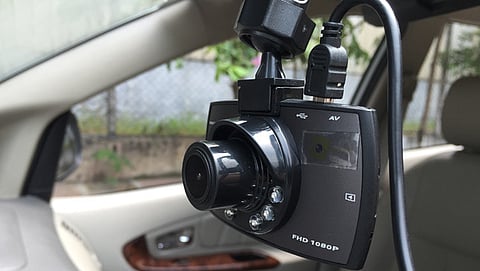Dashcams: are they legal in UAE?
Questions have arose whether or not motorists in the country can now mount video cameras on dashboards

Dubai: Dashcam videos showing wacky accidents or meteors are popular among YouTube viewers in the United States, but here in the UAE, sharing such videos in social networking sites may be illegal due to privacy laws.
However, questions have arisen whether or not motorists in the country can now mount video cameras on dashboards without fear of penalty or punishment.
Earlier this week, it was reported that a proposal was submitted to the Federal Traffic Council to allow drivers to use dashboard cameras out on the roads.
The idea behind the proposal was to eliminate any doubt behind the cause of road accidents, and to help authorities in identifying traffic offenders and catch them red-handed.
While Dubai Police have encouraged residents to submit images of criminal behaviour and traffic infractions, they have also warned against posting such information on social networking sites.
The legality of dashboard cameras may continue to remain under debate by authorities, yet road safety experts say that if the proposal gets an approval, the issue of technicalities and reckless drivers should be addressed.
“It will certainly play an important role in increasing the level of road safety, but a proper set of rules and regulations is needed,” said Thomas Edelmann, founder of Road Safety UAE.
“If dashboard cameras do become legal, motorists should know what type of devices can be used, such as the very basic ones that record low quality images, or the more sophisticated ones that has in-built GPS and speedometer,” he said.
Edelmann also said that clear guidelines should be set on how recorded material can be used, as technically speaking, video recordings and still photography of certain areas are illegal and consent must be given before people are filmed or photographed in public.
Dashboard cameras are banned in countries like Luxembourg and Austria. In Australia, recording on public roadways is allowed as long as it does not infringe on a person’s privacy.
If not a dash cam, what else? Some of the most trending car gadgets include a car headrest tablet holder for backseat passengers, a work surface tray that can be attached to the steering wheel and a smart vehicle monitoring device, which also provides notifications via app, text and email about the engine and battery health.
How dashcams can help drivers
Increase police efficiency: Recorded videos can be used as evidence by police and insurance companies, and save authorities time in solving traffic disputes.
Reckless drivers: Drivers are caught on camera as they break traffic rules, which can then be reported and followed up by police.
Help driving instructors: People attending driving classes can watch footage of drivers’ behaviour and learn the do’s and don’ts from real life settings.
Aid new drivers: Drivers new may not be able to handle risky road situations, but if equipped with a dash cam, they can ask parents and experienced drivers for advice on how they could have handled it better.
Capturing the Unexpected: While it may be intended for your safety and legal protection, the dashcam can capture the most unexpected events sometimes if left switched on 24/7
Sign up for the Daily Briefing
Get the latest news and updates straight to your inbox



